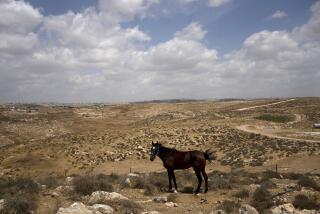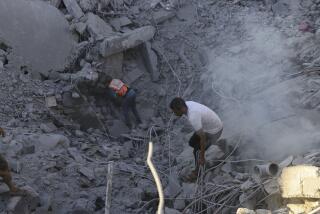In the Mideast, Steps Forward
The âtwo steps forward and one step backâ peace process between Israel and the Palestinians was seldom better demonstrated than last week. Israel made progress by freeing 400 Palestinian prisoners and setting June 21 as the date for a meeting between Israeli Prime Minister Ariel Sharon and Palestinian Authority President Mahmoud Abbas. Then it stepped backward by forging ahead with plans to build still more houses in the largest West Bank settlement, despite U.S. demands that settlements not be expanded.
Sharonâs claim during a Washington visit last month that his government would âdo our utmost to cooperateâ with Abbas was undercut by the solicitation of bids by Israelâs Lands Administration to build more homes in the settlement of Maale Adumim, near Jerusalem. Thatâs unfortunate because Abbas came away from his own trip to Washington, soon after Sharonâs, with something his predecessor, Yasser Arafat, never got: a White House meeting with President Bush. The photos, joint news conference and Bushâs demand that Israel freeze the settlements should show Palestinians that they benefit more from continuing the cease-fire.
Bushâs warm words for Abbas were a strong sign of Washingtonâs increased involvement in mediating between Palestinians and Israelis since Arafatâs death in November. The presidentâs announcement that Secretary of State Condoleezza Rice would soon visit both sides indicates the importance the administration attaches to the peace process. The stepped-up involvement of Army Lt. Gen. William Ward as a go-between on security issues between Israel and the Palestinians also is welcome. Past U.S. mediators have failed, but that was during Arafatâs tenure. Nonetheless, Ward will have to walk a fine line between Palestinian desires to get materiel -- weapons, armored vehicles and communications equipment to replace what Israel destroyed during the Palestinian uprising that began in September 2000 -- and Israelâs worry that the guns would wind up in the hands of terrorists.
A February meeting between Sharon and Abbas resulted in the Palestinian cease-fire, which has been largely successful. This monthâs meeting should discuss coordination of Israelâs planned August withdrawal from Gaza and four small West Bank settlements. Abbas needs to ensure that Israeli troops and settlers are not attacked as the Israeli government forces the settlers to leave their homes, especially in Gaza. The withdrawal is in Israelâs own interest, as Sharon recognizes, but Abbas could also use it to show the Palestinians the tangible benefits of negotiations rather than violence. Thereâs far to go before the Palestinian -- and Bushâs -- desire for an independent country is achieved, but the progress since November is encouraging, even with the occasional setbacks.
More to Read
Sign up for Essential California
The most important California stories and recommendations in your inbox every morning.
You may occasionally receive promotional content from the Los Angeles Times.









